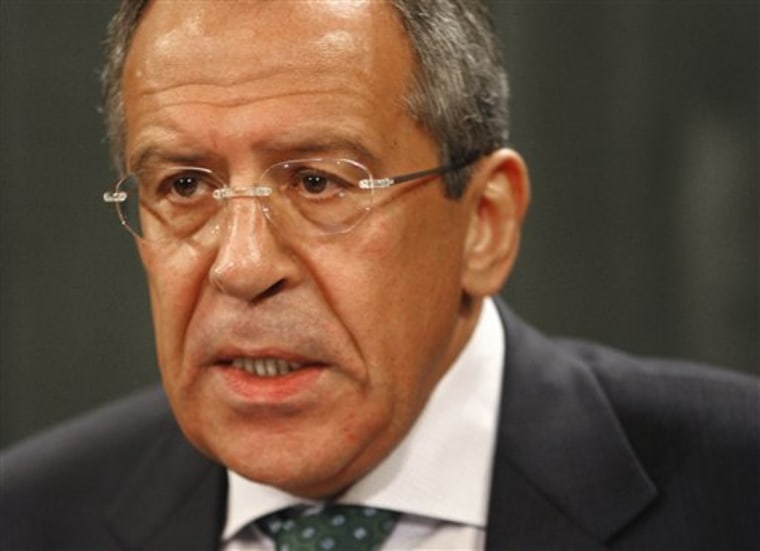Russia will station nearly 8,000 troops in two breakaway Georgian provinces, officials said Tuesday, announcing an imposing long-term presence less than a day after agreeing to pull forces back from areas surrounding the provinces.
Defense Minister Anatoly Serdyukov told President Dmitry Medvedev about 3,800 troops will each be based in South Ossetia and in Abkhazia — a far larger presence than before last month's war with Georgia.
Foreign Minister Sergey Lavrov said that level of military staffing was needed to prevent Georgia from trying to regain control of the two regions, which Russia has recognized as independent.
In a goodwill gesture, Russia pulled troops back from a Georgian town outside Abkhazia on Tuesday, one of 24 positions in Georgia that officials say are still held by the Russians.
It was the first sign of Russia's promised pullback from posts outside Abkhazia and South Ossetia. Georgian television showed residents of Ganmukhuri rejoicing.
Georgian security council chief Alexander Lomaia said the Russians had maintained three or four armored personnel carriers and a few dozen troops at Ganmukhuri.
On Monday, Medvedev and French President Nicolas Sarkozy revised the European Union-brokered deal to end the fighting between Russia and Georgia, whose European and American allies have struggled to respond to Moscow's assertion of regional military clout.
"Russian troops will remain on the territory of South Ossetia and Abkhazia on request of their leaders in parliament," Lavrov said at a briefing. "They will remain there for a long time. Their presence there will be needed at least for the foreseeable future to prevent any relapses of aggressive actions."
Russia has established diplomatic relations with the two regions.
'Necessary measures to avert threats'
Lavrov said he and his counterparts in the two regions also worked out treaties that envisaged close military and other links.
"Russia, South Ossetia and Abkhazia will take all the necessary measures to avert threats to peace," Lavrov said. "They will provide all kinds of assistance to each other, including in the military field."
The deal with Sarkozy envisaged the deployment of at least 200 EU monitors in the area surrounding the two breakaway regions by next month. The deal obliges Russia to pull out of those regions in 10 days following the deployment of EU monitors.
Lavrov cast the deal, accompanied by the EU guarantees that Georgia would not use force against the two provinces, as a victory for Russia.
He said Abkhazia and South Ossetia will be represented at an international conference on security in the region in Geneva next month.
War erupted between Georgia and Russia erupted on Aug. 7 when Georgia launched an attack to regain control over South Ossetia. Russia sent in troops who quickly routed the Georgian forces and pushed deep into Georgia.
Meanwhile, a senior U.S. official said that the U.S. is reviewing how to help Georgia rebuild its military after it was pulverized by Russia.
U.S. officials have been reticent about discussing renewed military aid to Georgia for fear of aggravating tensions as Russia continues to occupy parts of the country. Russia has lashed out at the United States for earlier training and supplying of Georgia's armed forces.
Undersecretary of Defense Eric Edelman told lawmakers at a Senate Armed Services Committee hearing that the Department of Defense is sending an evaluation team to Tbilisi, the Georgian capital, this week.
"We will review how the United States will be able to support the reconstruction of Georgia's economy, infrastructure and armed forces," he said.
Lawmakers at the hearing pressed Edelman and Assistant Secretary of State Daniel Fried to outline how the United States will respond to Russia's new assertiveness.
In a symbolic move Monday, President Bush canceled a civilian nuclear cooperation deal with Russia that was until recently viewed as an opening to ameliorate rising tensions.
Bush had sent the agreement to Congress for approval in May, after a much-heralded signing by the two nations that capped two years of tough negotiations. On Monday, Bush officially pulled it back.
"We make this decision with regret," Secretary of State Condoleezza Rice said in a statement read by spokesman Sean McCormack. "Unfortunately, given the current environment, the time is not right for this agreement."
Russia's Foreign Ministry said in a statement Tuesday that the decision was "erroneous and politicized" and would deal a blow to the U.S.-Russian cooperation and damage U.S. interests.
"The agreement on peaceful use of nuclear energy was equally beneficial to Russia and the United States, so the decision to opt out of it will hurt the U.S. nuclear industries no less than Russia's," the statement said.
